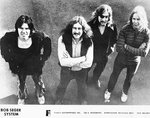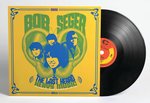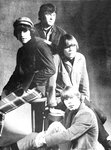


Depending on which Michigander you talk to, Bob Seger is either Michigan-rock royalty or a mainstrem balladeer. His long string of hits throughout the '70s and '80s made the Ann Arbor native an international star. Just last year, the bearded troubadour played his farewell tour in sold-out venues across the country. His setlist was, not surprisingly, stacked with his radio standards like “Main Street,” “Turn the Page,” “We’ve Got Tonight” and “Hollywood Nights,” among other chart-toppers.
Sure, those tunes have become Michigan anthems for some. Seger’s lyrics often paint a familiar picture for locals. In his signature song, “Night Moves,” he croons: “Out past the cornfields where the woods got heavy / Out in the back seat of my '60 Chevy.” It doesn’t get much more Michigan than that. But, obviously, that song, and his others, touched a nerve far beyond the backwoods of our home state. To date, Segar, 75, has sold over 75 million records across the globe.
But for those who grew up on the singer/songwriter during the '60s, they likely recall a much different Seger. Starting in the early-'60s, a mop-topped Seger played venues and teen clubs across the state. At the same time, he recorded piles of locally-produced garage rock 45s—none of which sound like his now-classic hits. Of course, back then, he was fresh out of high school and still finding his sound. But for those who prefer a punk edge and are quick to dismiss Seger as an FM radio rocker, I’d suggest they dig a little deeper into his discography. (Full disclosure: I appreciate all eras of Seger’s career).
Pre-stardom Seger starts in the early ’60s, with his earliest bands: The Decibels and The Town Criers. These pre-Beatles groups offered up a more late-50s style rock ’n roll and are beyond obscure. The 1961 acetate of soulful pop tune “The Lonely One,” by The Decibels is the ultimate find for Seger fans. It’s streamed nowhere and few copies exist. While it’s a bit rudimentary, the single features a 16-year old Seger on lead vocals and, shockingly, his trademark husky voice was already showing through.
After spending the first half of the ’60s gigging around the state, he ultimately formed Bob Seger & the Last Heard and also met up with his manager, Punch Andrews— whom he still works with to this day. Together, the two produced a stack of singles for Hideout (a Detroit imprint) and Cameo-Parkway Records (a notable Philly-based label).
By 1966, after countless shows and some local radio exposure, he was a full-on local star after his “East Side Story” hit No. 1 in Detroit. The fuzzy-n-frantic track also scored Seger his first television performance on “Swingin’ Time,” a local “American Bandstand”-style program that spotlighted bands of the era. The remarkable black-and-white footage is streamed on YouTube and worth a watch. It’s far from his later-era polished hits, but it’s some of his best work and is a visual document of the soon-to-be star.
Beyond that, “Persecution Smith” (another 1966 single) is another landmark Michigan-made track. As Seger frantically stabs away a flurry of piercing guitar notes, over it, he also belts out a Dylanesque howl. Its poignant and primal.
Soon after its release, Seger was sharing stages with fellow locals like The Stooges, Alice Cooper and The MC5. Today, that seems like an odd pairing, but back then, Seger’s raucous originals fit in just fine on a stage of heavy rockers—his 1967 single “Heavy Music” is proof of that. From there, he also released a series of (now out-of-print) albums that are also essential. From that pre-fame era, only his 1972 LP “Smokin' O.P.’s” album is in print. For years, Seger has refused to re-issue this stockpile of music — often stating that the production level and his voice is not up to snuff. It’s bizarre that a musician of his caliber has so much out-of-print music.
Still, if you search YouTube, you can find all of these albums streamed in full. They’re all worth a listen and show the progression of his songwriting ability. Similar to how Elvis Presley’s early Sun Records-era singles sound nothing like the King’s take of “Kentucky Rain,” these early Seger gems show the genesis of Michigan legend: “Ramblin' Gamblin' Man” (1969), “Noah” (1969), “Mongrel” (1970), “Brand New Morning” (1971). From start to finish on this batch of records, you’ll hear him evolve from a blistering progressive-rock unit into what became the more refined and dynamic Silver Bullet Band.
Luckily, after years of being shelved, his earliest singles were officially released in 2018 on the “Heavy Music: The Complete Cameo Recordings 1966-1967” LP. I’m sure Seger wasn’t pleased about this (as the Cameo release didn’t require his permission), but his true fans rejoiced. A proper document of his other out-of-print albums may never happen, so in the meantime, seek out the scuffed up old LPs and enjoy.
Support City Pulse - Donate Today!
Comments
No comments on this item Please log in to comment by clicking here